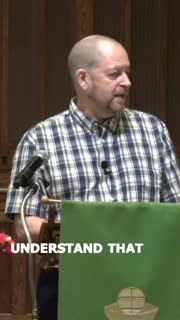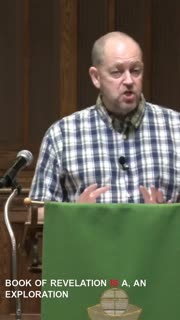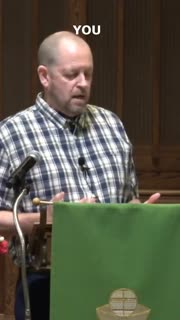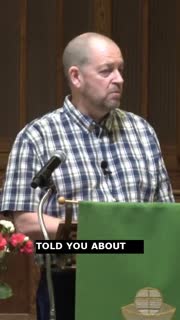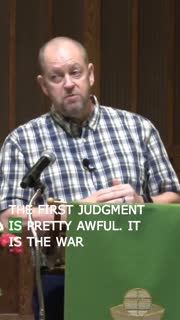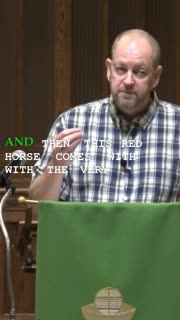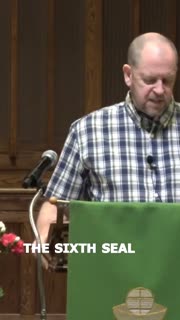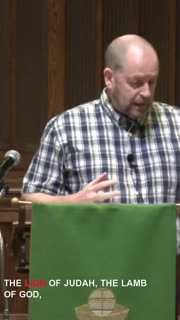Embracing the Depth of God's Judgment in Revelation
Devotional
Sermon Summary
Bible Study Guide
Sermon Clips
### Quotes for outreach
1. "I get it. I understand that most people come to this church, many, many churches, not just in our denomination, but across the Christian landscape. They come to church Sunday morning and they want to hear a message of God's love. They want to know that God is with them. They want to know that Christ is the personification of God's love." [01:49] (25 seconds)
2. "The book of Revelation is a, an exploration of what God's judgment truly means. And it is, it is hard and it is heavy. It is complicated and it's powerful. Because here's the thing about the text that you just heard, that we just shared together. We've already talked about the text of Revelation. We've already talked about the text of Revelation." [04:52] (25 seconds)
3. "You have to decide what part of this Christian Bible you're really going to embrace. Are you ready to fully embrace what, what is the full revelation of God in our scriptures? If all you want to do is focus on the love thy neighbor, that's a beautiful sentiment. I get it, but you can't just turn your back on this, this incredible vision, this incredible moment that ends our Bible." [21:45] (35 seconds)
### Quotes for members
1. "Well, the problem with sort of avoiding this subject and not talking about it is that we don't really want to talk about it. And I'm starting to think this actually in a more concerted way. I think it calls into the integrity of our. If we're not really prepared to look at the fullness of scripture, if we avoid entire books because we don't really kind of understand them or we don't like them, we're making a very selfish decision about what our view, our worldview will be of the Christian, through the Christian lens." [03:26] (60 seconds)
2. "The first judgment is pretty awful. It is the war horse between conquering and conquered people. Well, the sad thing about this white horse is that it's depicted as having the bowman on it. So that's the soldier with the bow and arrow. Well, here's an interesting little tidbit for you. At this time in history, the only real authority that was standing up pushing back against Roman empire from the East was the Parthians." [09:06] (41 seconds)
3. "And then this red horse comes with with the very notion of taking peace from earth itself this red horse represents all those things that we've been talking about in the past and we've been talking about in the past and we've we do to each other all the hatred the violence the manipulation the exploitation not only as individuals but as nations that red horse is an God's judgment on us." [09:06] (35 seconds)
4. "The sixth seal is that seal of indictment against the powerful, the rich, the kings that one stands on its own we don't need to go into too much detail anticipating the seventh seal why seven represents god the seventh seal but something amazing happens first and this is really important because it's kind of get lost and glossed over and it's been so badly manipulated and distorted by by pastors and ministers even this last week i was reading stories coming out of out of a pastor who runs one of these really large churches in the states who was was quoting this text about the another prophetic it's all happening now the end of times is happening now and he quotes from this this passage see something happens here the mark of the seal i want you to understand what this is the mark of the seal so an angel intervenes we've got all these horsemen we've got this terrible things happening and then there's this interlude everything stops and god will lead all of mankind and i'll speak for the good of science God's vision into this moment, as is directed by the angels, is to mark 144,000." [14:45] (88 seconds)
5. "The lion of Judah, the lamb of God, fully. Connected, but connected with the power of God's judgment in place. Folks, this is where you kind of have to make some decisions. And I, I leave this to each and every one of you. You have to decide what part of this Christian Bible you're really going to embrace. Are you ready to fully embrace what, what is the full revelation of God in our scriptures? If all you want to do is focus on the love thy neighbor, that's a beautiful sentiment. I get it, but you can't just turn your back on this, this incredible vision, this incredible moment that ends our Bible." [21:45] (64 seconds)
Ask a question about this sermon
1. "I get it. I understand that most people come to this church, many, many churches, not just in our denomination, but across the Christian landscape. They come to church Sunday morning and they want to hear a message of God's love. They want to know that God is with them. They want to know that Christ is the personification of God's love." [01:49] (25 seconds)
2. "The book of Revelation is a, an exploration of what God's judgment truly means. And it is, it is hard and it is heavy. It is complicated and it's powerful. Because here's the thing about the text that you just heard, that we just shared together. We've already talked about the text of Revelation. We've already talked about the text of Revelation." [04:52] (25 seconds)
3. "You have to decide what part of this Christian Bible you're really going to embrace. Are you ready to fully embrace what, what is the full revelation of God in our scriptures? If all you want to do is focus on the love thy neighbor, that's a beautiful sentiment. I get it, but you can't just turn your back on this, this incredible vision, this incredible moment that ends our Bible." [21:45] (35 seconds)
### Quotes for members
1. "Well, the problem with sort of avoiding this subject and not talking about it is that we don't really want to talk about it. And I'm starting to think this actually in a more concerted way. I think it calls into the integrity of our. If we're not really prepared to look at the fullness of scripture, if we avoid entire books because we don't really kind of understand them or we don't like them, we're making a very selfish decision about what our view, our worldview will be of the Christian, through the Christian lens." [03:26] (60 seconds)
2. "The first judgment is pretty awful. It is the war horse between conquering and conquered people. Well, the sad thing about this white horse is that it's depicted as having the bowman on it. So that's the soldier with the bow and arrow. Well, here's an interesting little tidbit for you. At this time in history, the only real authority that was standing up pushing back against Roman empire from the East was the Parthians." [09:06] (41 seconds)
3. "And then this red horse comes with with the very notion of taking peace from earth itself this red horse represents all those things that we've been talking about in the past and we've been talking about in the past and we've we do to each other all the hatred the violence the manipulation the exploitation not only as individuals but as nations that red horse is an God's judgment on us." [09:06] (35 seconds)
4. "The sixth seal is that seal of indictment against the powerful, the rich, the kings that one stands on its own we don't need to go into too much detail anticipating the seventh seal why seven represents god the seventh seal but something amazing happens first and this is really important because it's kind of get lost and glossed over and it's been so badly manipulated and distorted by by pastors and ministers even this last week i was reading stories coming out of out of a pastor who runs one of these really large churches in the states who was was quoting this text about the another prophetic it's all happening now the end of times is happening now and he quotes from this this passage see something happens here the mark of the seal i want you to understand what this is the mark of the seal so an angel intervenes we've got all these horsemen we've got this terrible things happening and then there's this interlude everything stops and god will lead all of mankind and i'll speak for the good of science God's vision into this moment, as is directed by the angels, is to mark 144,000." [14:45] (88 seconds)
5. "The lion of Judah, the lamb of God, fully. Connected, but connected with the power of God's judgment in place. Folks, this is where you kind of have to make some decisions. And I, I leave this to each and every one of you. You have to decide what part of this Christian Bible you're really going to embrace. Are you ready to fully embrace what, what is the full revelation of God in our scriptures? If all you want to do is focus on the love thy neighbor, that's a beautiful sentiment. I get it, but you can't just turn your back on this, this incredible vision, this incredible moment that ends our Bible." [21:45] (64 seconds)
